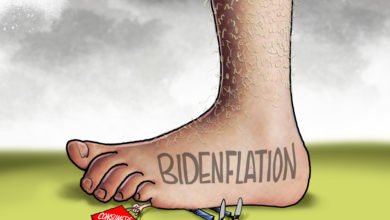Analysts Explain How Restarting The Economy Can Help Prevent Big Oil’s ‘Destruction,’ Save Energy Jobs

- Energy analysts say oil markets will continue their upheaval until lockdowns abate and demand picks up, meaning the U.S. could continue to lose millions of barrels of oil a day through spring.
- President Donald Trump, meanwhile, says the United States will top off the Strategic Petroleum Reserve, allowing the government to buy as much as 75 million barrels of oil from select oil producers.
- Texas Rep. Jon Rosenthal, a Democrat, argues that if the lockdowns linger and the economy falls into a deeper swoon, then oil wells will be capped and thousands of energy workers will be laid off.
The best way to stop an oil market free fall and a massive loss of energy jobs is to restart the U.S. economy, energy analysts argue as officials defend the use of roving lockdowns to slow a pandemic,
Prices tumbled Monday even after the Organization of Petroleum Exporting Countries decided on April 13 to decrease crude output, bringing an end to a lengthy oil war between Russia and Saudi Arabia. The price war coincided with the coronavirus pandemic, creating a one-two punch.
Big oil’s fortunes are ultimately tied to demand in the market, which can only increase if the economy comes back online, according to Lou Pugliaresi, president of Energy Policy Research Foundation. Others share his sentiments.
“The problems in the oil market are a symptom, the remedy is restoring demand,” Pugliaresi told the Daily Caller News Foundation before noting that there is a no solution that doesn’t involve an increase in demand.
President Donald Trump’s decision to intervene in talks between Saudi Arabia and Russia to lower oil output helped somewhat, but demand is the answer to the problem, Pugliaresi explained. He is referring to the stay-at-home orders officials instituted to slow the virus.
The move to curtail production won’t be enough to compensate for the loss in demand as Americans stay at home, leaving airplanes and cars idle in garages and hangers across the United States, traders and analysts said.
Such forms of transportation account for nearly 60% of oil consumption.
Michigan Gov. Gretchen Whitmer and California Gov. Gavin Newsom are two of the biggest proponents of stay-at-home orders, with neither Democratic governor signaling their willingness to ease up on the measures.
Critics pounced on Whitmer in particular after she issued an executive order on April 11 deeming several home-improvement and gardening items “non-essential” and therefore not on sale in shops throughout Michigan during the health crisis.
Other city mayors and governors support such economic restrictions and forced lockdowns. The stay-at-home orders have resulted in roughly 22.5 million people filing unemployment applications over the past four weeks.
Energy analysts worry prolonged inactivity will cause significant long term harm in the energy markets.
“The bottom line is that we need to begin the process of starting all the world’s economies to limit the massive destruction in national death, restore employment and shift expectations on prospects on future economic growth,” Pugliaresi said. Other analysts also noted the demand shock is the problem.
Monday’s negative prices are a result of future contracts tied to a specific delivery date.
The price converges with the physical price of oil toward the end of a contract data as the buyers of the contracts are airlines or refineries that will take physical possession of the crude. Thus next month’s oil could climb as high as $25 per barrel before dropping again as the next contract expires.
Government officials cannot bank on the peculiarity of these contracts to secure the market, according to Jim Burkhard, vice president and head of oil markets, IHS Markit.
“Emergency conditions—especially lack of places to store oil—will remain until stay-at-home orders ease and production cuts can diminish the severe oil supply surplus,” Burkhard said in a statement Monday before noting that the lockdowns could remove as much as 17 MMb/d of supply.”
The Department of Energy announced on April 14 that it is willing to provide space within the country’s Strategic Petroleum Reserve to store excess crude oil. The DOE is negotiating with unnamed oil companies on contracts to hold about 23 million barrels of crude oil storage in reserve.
Trump, for his part, is still looking to top off the SPR.
“We’re looking to put as much as 75 million barrels into the reserves themselves, that would top it out,” he said during a White House briefing Monday. “That would be the first time in a long time it’s been topped out. We’d get it for the right price.”
The president’s remarks come after Congress refused to allocate a $3 billion economic stimulus package to fill the SPR.
Texas Rep. Jon Rosenthal, a Democrat, explained what he believes will be the endpoint if the economy doesn’t bounce back within the next several months.
“When contracts come due and there is no place to keep product, buyers will effectively pay producers to not deliver,” Rosenthal wrote in a tweet Monday, referring to the rock bottom West Texas Intermediate crude prices.
“[P]roducers will have to pay for storage” if demand falls off the cliff, Rosenthal noted.
“That is how the price per barrel appears to be negative,” he added. What this all means is that producers “will shut down wells. Workers will be let go, from roughnecks to retailers,” which will inevitably lead to a massive uptick in unemployment up and down Texas,” Rosenthal argued.
Content created by The Daily Caller News Foundation is available without charge to any eligible news publisher that can provide a large audience. For licensing opportunities of our original content, please contact licensing@dailycallernewsfoundation.org



